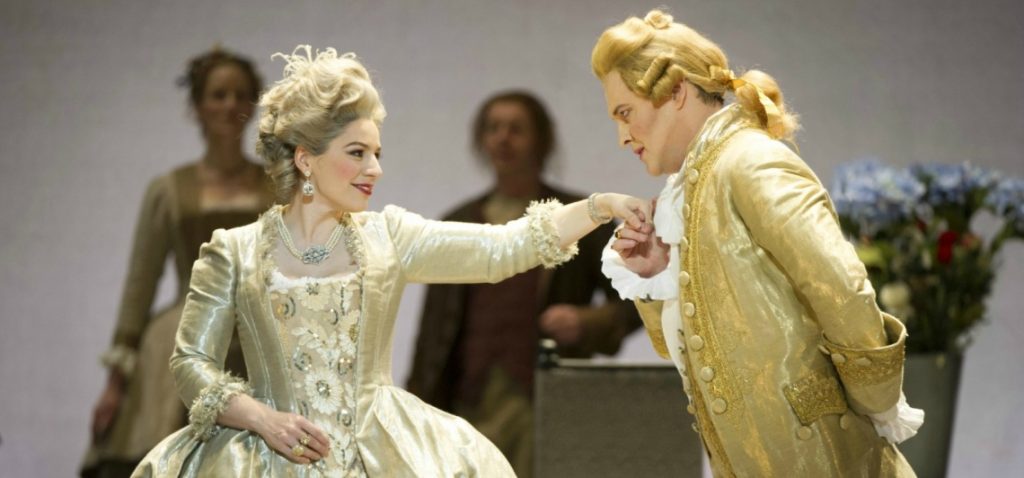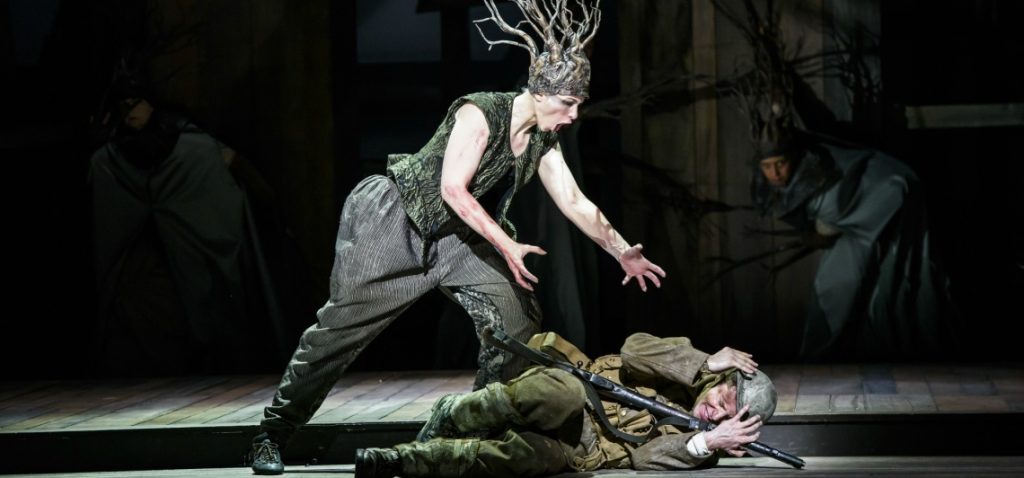Figaro Gets a Divorce & In Parenthesis / Welsh National Opera / Wales Millennium Centre / Sunday 21st February 2016 & Friday 13th May 2016
Article by Weeping Tudor.

One of the greatest parts of the Cardiff cultural scene is the huge commitment seen by Welsh National Opera in creating new operatic works. In the past two seasons, two large scale works have created a lot of buzz around the WMC, since, after all, a world premier of an opera is always an exciting prospect.
Part of the Figaro Forever! season, Figaro Gets A Divorce was the new commission from Russian born composer Elena Langer. Completionists could rejoice as the Figaro trilogy of plays by Beaumarchais finally came to an end in opera form, after the previous efforts of Mozart and Rossini. Taking a much more serious tone than the other two works, we see Figaro, the Count and the Countess – characters we have gotten to know and love – run for their lives after the revolution.
This was the same lead cast as The Marriage of Figaro, adding to the follow-on nature of the piece. All were super in these newly-created roles and the additions of Marie Arnet as a sexy and sensational Susana, Andrew Watts as a camp and loving Cherubino (who didn’t die in battle then) and Alan Oke as the ruthless Major was some great casting. Oke’s vocal line was somewhat bizarre, bleeding into the score in a merrily menacing way. The sets came into their own here and worked better than the other operas. Director David Pountney also wrote the libretto: a witty, charming piece of writing packed with barber puns and deep sexual innuendo.
[Related: Review: WNO – The Marriage of Figaro @ WMC]
Langer’s score is jazzy and suspenseful, and Cherubino’s death had the orchestra go mad (my favourite moment of the whole evening). A touching ending harking back to the previous Figaro masterworks felt like a completely satisfying way to wrap up this story arch from 200 years ago. Both the Count and Countess decide to stay behind in the asylum whilst the others have fled, and they await their fate as they sing a heart-rendering duet. A brief piano quote is heard and then a final tinkle from the percussion leads to the piece’s conclusion.
A great score, with the second act having much urgency in the writing.
Tributes to World War One (WWI, 1914-1918) continue to be met, as they have been for the last two years in the centenary commemoration.
Since taking part in NTW’s production of Mametz, I’ve been educated about The Battle of Mametz Wood, which involved the loss of many Welsh soldiers. The Battle of Mametz Wood is a drop in the ocean of WWI, but the lack of the public’s knowledge is void of any sort of justification. These local men who fought in the battle should be better remembered than just as a footnote in dogeared annals of the so called “Great War”.
[Related: Lest We Forget? A Hundred Years From War]
In comes In Parenthesis, a prose-poem masterwork by David Jones, an artist who survived this awful scene of carnage. “I never had to go back to Mametz, it was always with me” is his chilling account of an unforgotten time in his life. Why this isn’t in the curriculum in Wales is a travesty, though Owen Sheers related poem thankfully is and, along with Jones’ work, was the base for the production of Mametz in Monmouthshire.
From one 14-18 NOW commission to another, In Parenthesis gets the opera treatment by Iain Bell, with a libretto by David Antrobus and Emma Jenkins. All have done justice to the source material and created an evening crammed with foreboding, having moving moments of terror and sorrow. Like with Britten’s War Requiem, it cuts to the nitty grittiness of war and displays it at its most gripping and unbearable.
Bell’s take on A Christmas Carol frequented our Christmas season last year and was only no more than it should have been and everything I expected it to be. Here, he has improved his harmonic language, thanks to the forces of WNO’s chorus and orchestra. Compositionally, it’s thankfully never overbearing on the two-hour mark that most new operas fall casually into. Perhaps another composer would have gone wild with more brass and percussion, keen to have a more militaristic impact on the sound of the piece. Even though I craved some moments of sheer wildness, it still maintained a fine standard of music-making.
Antrobus and Jenkins have given the protagonist, Private John Ball an actual voice (he doesn’t talk in the original), adding clout to his journey and our feelings for him. Sung by Andrew Bidlack, he is our charming, clumsy young lad who is witness to hellish visions on his way to the front. He is a grand tenor and makes for a compelling operatic lead. In this all-male cast, Alexandra Deshorties is playing triple roles, but is most remembered as the Bard of Germania, an addition to the opera who narrates the events with Peter Coleman-Wright as the Bard of Britannia. Both have theatrical stature and lurk around the stage, detailing what has happened and the awful events to unfold.

Their other roles are less colourful, with Deshorties as The Queen of the Woods and Coleman-Wright dressed as a medical warrior with armour and a cape to boot. Donald Maxwell, in a rare singing appearance, is Dai Greencoat, one of the “old boys”, who seem to have fate on their side. He is full of camaraderie and a charm, whilst the Marne Sergeant is played by a decreed and graceless Graham Clarke.
Their scene together where they argue over who has seen more battles, each rebuttal more vulgar and unbelievable, is a highlight, as is the German Christmas carol. Nice to see the female chorus present in what is another male-dominated piece. Both choruses always make it up to the stand and create that stirring operatic zeal that couldn’t be replicated elsewhere. The final part of the opera, where the deceased soldiers become part of nature and rejuvenation occurs in the wood, is soupy but still touching. Earlier, the women of the chorus were silly Edward Scissorhands trees, reminding me of the Harpies in Birtwhistle’s The Minataur. The orchestra, as always, are in fine form, fiery-eyed for any new score sent their way.
The set is another success, built like a Welsh chapel with the background made to look like the deserted wood after the battle. A raising platform on the ground is the impressive finishing touch.
Rousing, engaging and a true tribute.
Tributes to these fallen Welsh soldiers were then paid outside the WMC, in a light installation that contains over 900 red orbs, representing each of the Mametz fallen. We heard The Last Post and then all had a walk around. This was prior to the idiot vandals who felt the urge to wreck up the work. Expect to see some filmwork on the way from me about this.
Figaro Gets A Divorce rating: 4 stars
In Parenthesis: 4 stars
In Parenthesis continues at the WMC, then on tour to London and Birmingham. It shall air online on the Opera Platform in the near future. Cavalleria rusticana & Pagliacci is also performed this season.
WNO are part of the Festival of Voice with La voix humaine by Poulenc and Kommilitonen! by Peter Maxwell Davies.
WNO’s autumn season is Shakespeare-inspired, with the UK premier of The Merchant of Venice by André Tchaikowsky, Verdi’s Macbeth and Cole Porter’s Kiss Me Kate.
Related Articles:
Review: WNO – Barber of Seville @ WMC
Review: WNO – The Marriage of Figaro @ WMC
Lest We Forget? A Hundred Years From War
Review: War Horse @ WMC
More:
See all reviews on theSprout here (pre-May 2016 here)*.
Looking for more things to do? Look at our Info section called, erm, Things To Do.
Get Involved:
Want to reach thousands of young Cardiffians? Submit your news here or register to become a contributor.
*Want to become a reviewer? Join the Sprout Editorial Group on Facebook or email tom@thesprout.co.uk.
The next Sprout Editorial Group meeting is Thursday 26th May 2016 in Cardiff Central Library.
Images credits: WNO website




